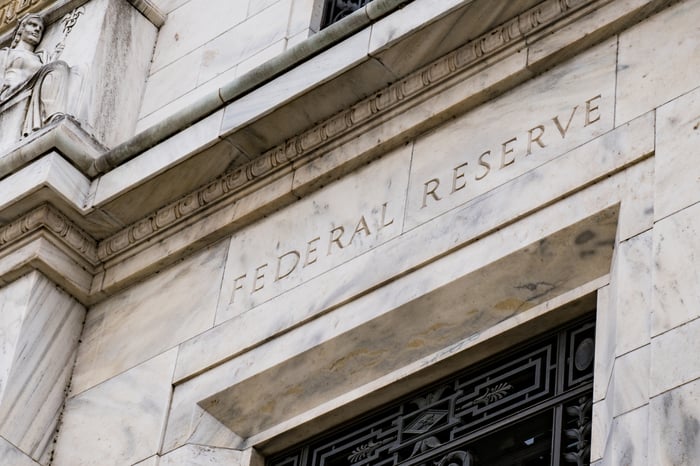Why Is Buffett Selling Bank Stocks If He Loves the Industry So Much?
Join thousands of savvy investors and get:
- Weekly Stock Picks: Handpicked from 60,000 global options.
- Ten Must-Have Stocks: Essential picks to hold until 2034.
- Exclusive Stock Library: In-depth analysis of 60 top stocks.
- Proven Success: 10-year track record of outperforming the market.
This article originally appeared on The Motley Fool, written by Sean Williams.
There's probably not a more revered or successful investor than Berkshire Hathaway (NYSE:BRK.A)(NYSE:BRK.B) CEO Warren Buffett. The Oracle of Omaha, as he's come to be known, began investing at the age of 11, and since the 1950s has grown his net worth from around $10,000 to a hearty $70 billion. He's also absolutely trounced the broader market for the past five-plus decades, with the benchmark S&P 500returning 19,784%, including dividends, between 1964 and 2019, and Berkshire Hathaway's per-share market value increasing a tidy 2,744,062% over the same time frame!
Suffice it to say that when Buffett speaks or makes a move in his company's investment portfolio, Wall Street and retail investors tend to pay very close attention.
Say what? Buffett has been selling bank stocks
However, if you look close enough, you'll notice a very interesting selling trend for Buffett and his team of late.
Although Buffett has historically been a net buyer of equities and a strong believer in the long-term outlook for the U.S. economy -- a thesis he echoed during his recent annual shareholder meeting -- the company's required filings with the Securities and Exchange Commission in recent quarters have shown quite a bit of selling activity among Berkshire's bank stock holdings (note, this write-up is being done prior to the release of Berkshire Hathaway's 13F filing on May 15, 2020).
- Between May 11 and May 12, Berkshire disposed of 497,786 shares of U.S. Bancorp (NYSE:USB).
- Between April 7 and April 8, Berkshire sold 869,103 shares of Bank of New York Mellon (NYSE:BK).
- During the fourth quarter of 2019, Berkshire reduced its holdings in Wells Fargo (NYSE:WFC) by 55,156,100 shares.
- Also during the fourth quarter of 2019, Berkshire dumped 2,240,000 shares of Bank of America(NYSE:BAC).
Buffett has long devoted most of his research to the banking industry, and as recently as last year had more than 45% of the company's invested assets tied up in financials. So, what gives? Why is Buffett, an investor who clearly loves the banking industry, selling bank stocks of late - especially when the coronavirus disease 2019 (COVID-19) has brought valuations down to multiyear lows?
Buffett's benign reason for reducing his bank stock holdings
The good news for bank stock fans is that the Oracle of Omaha hasn't lost his mind or his longing for financials. Rather, there's a pretty benign reason that accounts for most of this recent selling activity: Buffett not wanting to own a larger than 10% stake in these banks.
You see, if Berkshire Hathaway were to maintain a greater than 10% stake in a publicly traded bank, it could be classified as a bank holding company (BHC). This 10% threshold is often viewed as a line in the sand whereby Berkshire Hathaway is perceived to exercise control over a bank. If Berkshire were classified as a BHC, it could face a host of new regulations imposed by the Federal Reserve, including restrictions on possible business activities that it could enter into. As a reminder, Buffett's company has made about 60 acquisitions over many decades, and a number of these companies operate in the financial space.
As long as Buffett keeps his company's ownership stake in bank stocks under 10%, he remains an investor and not an entity that's deemed as a controlling party.
Prior to the coronavirus wreaking havoc on the U.S. economy, business was largely booming for big banks. Last summer, most banks were approved by the Federal Reserve to return record amounts of capital to shareholders through bigger dividends and juiced-up stock buybacks. It's these buybacks that necessitated Buffett and his team to pare down its stakes in U.S. Bancorp, Bank of New York Mellon, and Bank of America recently. Even if Berkshire wasn't buying additional shares of these bank stocks, their steadily declining outstanding share count due to aggressive buyback policies would have been enough to put Buffett's company above the 10% ownership threshold.
There is one bank stock that Buffett may genuinely not be as fond of anymore
However, this may not entirely be the case for Wells Fargo. While it's pretty evident that Berkshire's recent selling in U.S. Bancorp, Bank of NY Mellon, and Bank of America was solely designed to keep the company below, but still very near, a 10% stake, Berkshire has been regularly (and sometimes aggressively) selling its holdings in Wells Fargo since the second quarter of 2017.
To be clear, share buybacks are playing a role in this reduction. According to quarterly data found on YCharts, Wells Fargo has repurchased $41.8 billion worth of stock since the midpoint of 2018. Such a significant reduction in its outstanding share count has required Buffett to regularly pare down its holdings in the company to avoid crossing above the 10% threshold.
But there are other factors at play here. It was uncovered in 2016, and later updated in 2017, that between January 2009 and September 2016 Wells Fargo had created 3.5 million unauthorized accounts. This disclosure eventually led to Wells Fargo paying a $3 billion settlement to the Justice Department earlier this year, and more importantly cost it the trust of consumers. There's little that gets under Buffett's skin more than a company that loses the trust of consumers.
Though Wells Fargo has replaced its CEO (twice) and is working on rebuilding trust with the banking community, Buffett might feel it prudent to continue paring down his company's stake in the clearly embattled bank.
MyWallSt operates a full disclosure policy. MyWallSt staff currently hold long positions in stocks mentioned above. Read our full disclosure policy here.
Sean Williams owns shares of Bank of America. The Motley Fool owns shares of and recommends Berkshire Hathaway (B shares) and recommends the following options: long January 2021 $200 calls on Berkshire Hathaway (B shares), short January 2021 $200 puts on Berkshire Hathaway (B shares), and short June 2020 $205 calls on Berkshire Hathaway (B shares). The Motley Fool has a disclosure policy.
- Weekly Stock Picks: Handpicked from 60,000 global options.
- Ten Must-Have Stocks: Essential picks to hold until 2034.
- Exclusive Stock Library: In-depth analysis of 60 top stocks.
- Proven Success: 10-year track record of outperforming the market.



